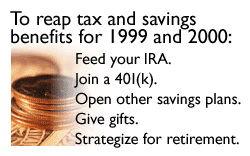|
Get tax smart on savings
|
 |
February 24, 2000: 10:47 a.m. ET
The top five things you can do to bolster your nest egg between now and tax day
By Staff Writer Jeanne Sahadi
|
NEW YORK (CNNfn) - If "lazy bones" is your pin name for your retirement funds, take heart -- there's still time to redeem yourself.
Tax season is here, but it needn't be just another occasion to sign away money to the government. You also should corral some dollars for your future if you didn't already do so in 1999.
CNNfn.com talked to accountants and financial planners to find out what you can do between now and tax filing day - April 17 (or later if you take an extension) - to bolster your retirement savings and reap the tax benefits for 1999 and 2000.
Here are their top suggestions:
Feed your IRA or Keogh
There's still time to pay yourself and have it count as a 1999 contribution. With the exception of a self-directed IRA and a Roth, your accounts must have been established as of Dec. 31:
- Self-directed IRAs: You can contribute up to $2,000 by April 17 and deduct it on your return.
- Roth IRAs: You can contribute up to $2,000 in after-tax money by April 17.
- SEP-IRAs: You can contribute up to 15 percent of your personal gross income up to your date of filing, including extensions.
- Simple IRAs: You no longer can contribute for 1999, but your employer's contribution -- up to 3 percent or $6,000, whichever is less -- can be made up until the tax filing date.
- Profit-sharing Keogh: You can contribute up to 15 percent net of your net income (which equals 13.04 percent of net income) by the filing date, including extensions.
If you're smart, you'll throw in your 2000 contributions while you're at it.
 "There's no reason you can't double the benefit," said certified financial planner Suzette Loh. "There's no reason you can't double the benefit," said certified financial planner Suzette Loh.
And you should, said Steven S. Shagrin, president of the International Society for Retirement Planning, "That way, you get a whole year of deferral on the income."
So if you're planning to contribute to an IRA for tax year 2000, do it now rather than later because otherwise that money would sit in your bank or brokerage account accruing interest or capital gains on which you would then owe tax.
Join your 401(k) plan
The earlier you throw your hat into an employer-contribution plan, the better off you'll be, experts say. Think "free money" and "the joy of compounding." That goes not just for 401(k)s, but also 403(b)s and Simple IRAs as well. Also, at many companies there's a defined window of opportunity during which you can sign up for such programs, and often that's in the beginning of the year, Loh said.
Don't be stingy, either.
"Not only join, but max out your contributions," said certified public accountant Thomas J. Geraghty Jr. "Don't just go up to the point of the match."
If your employer doesn't contribute to your plan, now's the time to lobby for a matching program, Loh suggested.
Contribute to other retirement plans
Retirees cannot live on 401(k)s alone. So, if you haven't already, set up an automatic savings plan that deducts money from your bank account on a regular basis and funnels it into an investment account with your broker.
Give gifts
Generosity is good for your karma, but it can be even better for your estate, especially if you're already retired. The earlier you start in the year, the lighter your load will be Dec. 31.
You can give away up to the lifetime unified credit limit of $675,000 free of estate taxes, said CPA P. Jeffrey Christakos. Keep in mind, that amount will increase to $1 million by 2006.
So, if your goal is to start minimizing estate taxes for your heirs, start by off-loading your fastest-growing assets first.
 For instance, the worth of an Internet stock you own may balloon over the next few years. If you give it to your daughter now, she benefits from the growth and your estate doesn't get saddled with it should you die in the interim. If you left it to her after the stock soared, your estate would be taxed on the bulk of the increase. For instance, the worth of an Internet stock you own may balloon over the next few years. If you give it to your daughter now, she benefits from the growth and your estate doesn't get saddled with it should you die in the interim. If you left it to her after the stock soared, your estate would be taxed on the bulk of the increase.
"Give it away before it grows," Christakos said.
It's also smart to give away securities that you've owned the longest. In most instances, your kids will have to pay only long-term capital gains when they sell, regardless of how long they held the stock, Geraghty said.
As for those tax-free $10,000 gifts, you and your spouse can double that amount even if you're giving something that is not jointly held, Christakos said. Say a husband owns an asset worth $20,000 and wants to give it to his child tax-free. All his wife must do is sign the gift-tax return, indicating she had received a $10,000 gift from her spouse. She, in turn, can give her portion to the child.
Plan your future
Since the siren call of spring is still a ways off, use those last bitterly cold evenings in the first quarter to map out long-term financial strategies.
For starters, reassess your exemptions. If you're overpaying the government, change your withholding and put the difference to work in your investments, Geraghty said.
Then revisit your retirement objectives. Think hard about what you want your money to do for you down the line.
"Kick back, and envision how you see your life progressing," Shagrin said. "Then work backwards to figure out how you can get to that point." 
|
|
|
|
|
 |

|

